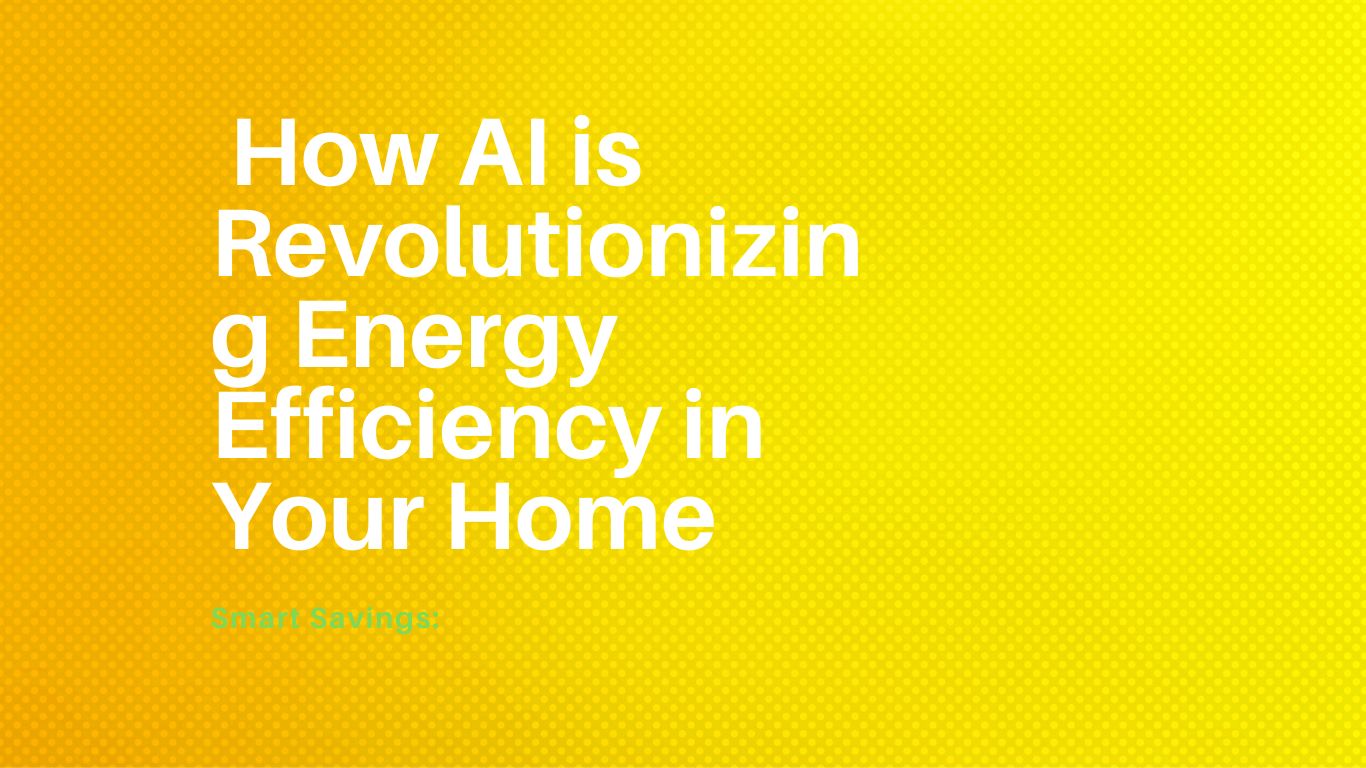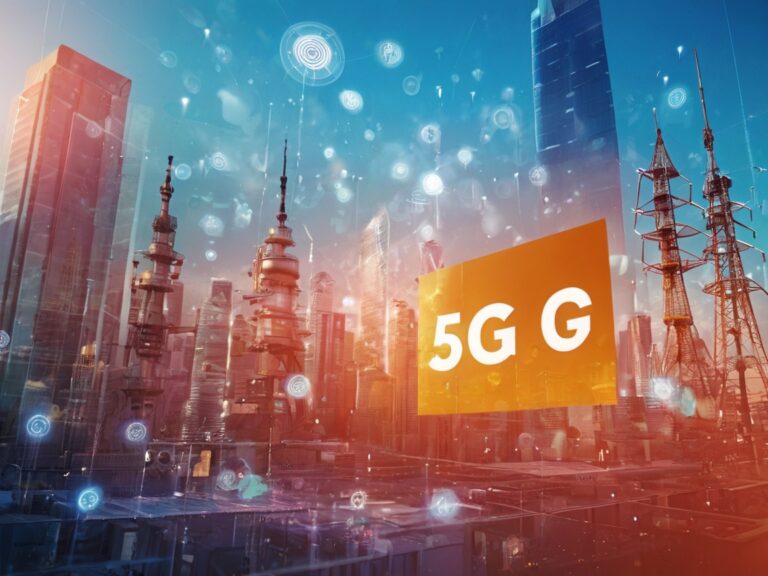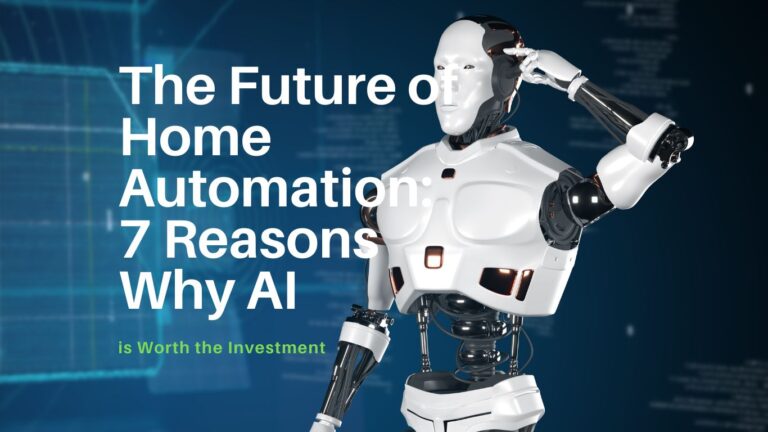Smart Savings: How AI is Revolutionizing Energy Efficiency in Your Home
As energy costs continue to rise and environmental concerns become increasingly pressing, homeowners are seeking innovative solutions to optimize energy usage in their homes.
In this quest for efficiency, artificial intelligence (AI) is emerging as a powerful ally, transforming how we manage and consume energy.
By leveraging advanced algorithms and data analytics, AI technologies are revolutionizing energy efficiency in smart homes, providing homeowners with smarter ways to save money and reduce their carbon footprints.
In this article, we will explore the role of AI in enhancing energy efficiency, examine various applications of AI-powered devices, and discuss the benefits these technologies bring to homeowners. Additionally, we will look ahead to future developments in AI and their potential to further improve energy management in our living spaces.
The Role of AI in Energy Efficiency
A. Definition of AI-Powered Smart Devices
AI-powered smart devices are innovative technologies that utilize artificial intelligence to perform tasks and make decisions based on data inputs. These devices can analyze patterns, learn from user behavior, and optimize their operations to enhance energy efficiency. They are integral to creating smart homes that adapt to the needs of their occupants while minimizing energy waste.
B. Examples of AI Applications in Home Energy Management
1. Smart Thermostats
One of the most well-known examples of AI in energy management is the smart thermostat. Devices like the Nest Learning Thermostat use machine learning algorithms to understand household patterns and preferences. By learning when occupants are typically home or away, these thermostats can automatically adjust heating and cooling settings to maximize comfort while minimizing energy consumption. For instance, during winter, the thermostat may lower the temperature while the house is empty and raise it shortly before the occupants return, ensuring a comfortable environment without wasting energy.
2. Smart Lighting Systems
Another area where AI is making strides is in smart lighting systems. These systems can utilize occupancy sensors, daylight sensors, and user preferences to optimize lighting usage throughout the home. For example, AI can automatically dim lights when natural daylight is sufficient or turn them off entirely in unoccupied rooms. By adjusting lighting based on actual needs, these systems significantly reduce energy consumption while enhancing the overall user experience.
3. Energy-Efficient Appliances
AI is also being integrated into various household appliances, from refrigerators to washing machines. Smart appliances can analyze usage patterns and adjust their operations accordingly. For example, a smart washing machine can determine the optimal water temperature and cycle duration based on the load size and soil level, ensuring efficient energy use without compromising cleaning performance. Additionally, some appliances can communicate with each other, creating a cohesive energy management system that further enhances efficiency.
How AI Optimizes Energy Consumption
A. Machine Learning Algorithms and Usage Pattern Analysis
At the heart of AI-driven energy efficiency are machine learning algorithms that analyze vast amounts of data to identify usage patterns and trends. These algorithms learn from past behaviors, enabling them to predict future energy needs accurately. For instance, by monitoring daily routines, AI can determine when specific appliances are typically used and adjust their operation times to optimize energy consumption.
B. Real-Time Adjustments Based on Occupancy and Behavior
AI-powered systems excel in making real-time adjustments based on occupancy and behavior. For example, if a homeowner leaves a room, smart devices can detect the absence and automatically turn off lights or adjust the temperature. This instantaneous response helps to eliminate energy waste and ensures that energy is used only when and where it is needed.
C. Integration of External Data
In addition to analyzing internal data, AI can also integrate external information, such as weather forecasts and energy pricing. By considering factors like temperature changes or peak energy pricing hours, AI can make informed decisions to optimize energy usage. For example, a smart thermostat might pre-cool a home during off-peak hours when energy prices are lower, ensuring comfort while minimizing costs.
Benefits of AI-Driven Energy Management
A. Significant Savings on Utility Bills
One of the most compelling reasons to adopt AI-powered energy management solutions is the potential for significant savings on utility bills. Homeowners can reduce their energy consumption and, in turn, their monthly expenses by optimizing usage patterns and eliminating waste. Research has shown that homes equipped with smart thermostats can save between 10% to 15% on heating and cooling costs, translating to substantial savings over time.
B. Reduction of Carbon Footprint and Environmental Impact
Beyond cost savings, AI-driven energy efficiency contributes to a more sustainable lifestyle by reducing the carbon footprint of households. By optimizing energy consumption, these technologies help decrease greenhouse gas emissions associated with energy production. As more homeowners adopt AI solutions, the cumulative effect can lead to a significant positive impact on the environment, aligning individual actions with broader sustainability goals.
C. Enhanced Convenience and Comfort for Homeowners
AI technologies also enhance the convenience and comfort of living in smart homes. With automated systems that learn user preferences and adjust settings accordingly, homeowners can enjoy a seamless and personalized living experience. For instance, smart lighting can create the perfect ambiance for different activities, while smart thermostats ensure a comfortable temperature throughout the day. This blend of comfort and efficiency makes smart homes appealing to a growing number of consumers.
Future Developments in AI and Energy Efficiency
A. Expected Advancements in AI Technologies
As AI technology continues to evolve, we can expect even more advanced applications in energy management. Future AI systems will likely incorporate more sophisticated machine learning algorithms, allowing them to learn from an even broader range of data sources and improve their predictive capabilities. This advancement could lead to more accurate forecasts of energy needs and more effective energy management strategies.
B. Potential New Applications in Energy Management
Innovations such as edge computing and the Internet of Things (IoT) will further enhance AI’s role in energy efficiency. By processing data closer to the source, edge computing allows for faster decision-making and real-time adjustments to energy usage. Additionally, the proliferation of IoT devices will create a more interconnected home environment, enabling AI systems to coordinate multiple devices seamlessly for optimal energy management.
C. Long-Term Implications for Homeowners and the Environment
The long-term implications of AI in energy management are profound. As AI technologies become more integrated into our daily lives, homeowners will increasingly benefit from enhanced energy efficiency, lower utility bills, and improved comfort. Moreover, as more households adopt these technologies, the collective impact could significantly reduce energy demand and greenhouse gas emissions, contributing to a more sustainable future for our planet.
Conclusion
In conclusion, AI is revolutionizing energy efficiency in smart homes by providing innovative solutions that optimize energy usage and reduce costs. Through the use of machine learning algorithms, real-time adjustments, and external data integration, AI-powered devices offer homeowners significant savings on utility bills while minimizing their environmental impact.
As technology continues to evolve, the potential for AI in energy management will only grow, paving the way for smarter, more efficient living environments. Homeowners who embrace AI technologies can enjoy enhanced comfort, convenience, and savings while also contributing to a more sustainable future. By investing in these innovations today, we can create homes that are not only energy-efficient but also aligned with our environmental goals, ultimately leading to a greener planet for generations to come.



